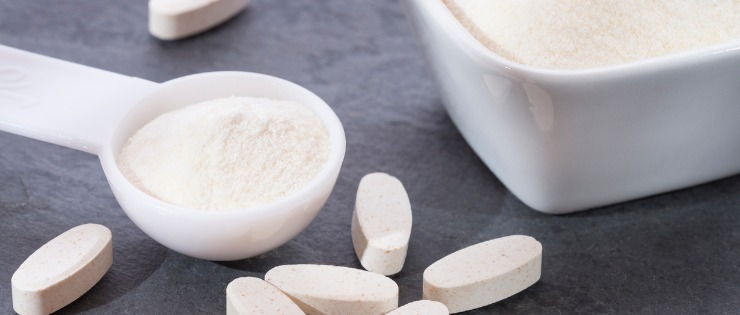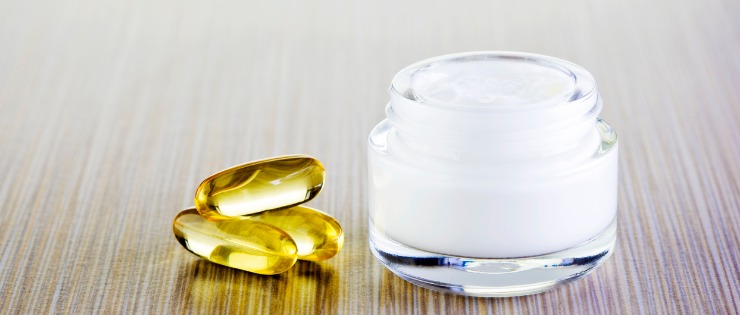
Much of the world’s population is searching for eternal youth. Collagen has been touted as the possible elixir for youthful and glowing skin. Collagen supplements have been promoted to improve the appearance of skin, reduce inflammation and joint pain, reduce artery stiffness, and improve digestive health. But can collagen supplements do all of this?
What is Collagen?
Collagen occurs naturally in our bodies and is the most abundant protein in the body. It's the main component of our skins tissue, bones, muscles, cartilage, tendons, blood vessels, and gut. Collagen is a hard, insoluble and fibrous protein. It makes up one-third of the total protein count in the human body. There are at least 16 different types of collagen, but our body mainly consists of types 1, 2, and 3. In most collagens, the molecules are packed together to form long, thin fibrils.
What Happens to Our Bodies Natural Collagen Production?
As we age, our collagen stores reduce, and our body makes poorer quality collagen. Everyone loses collagen at different rates. While age is a major factor, the environment and genetics play a big part. Environmental factors include poor lifestyle choices such as smoking and eating a diet high in sugar. Poor diet creates free radicals that increase the speed of collagen breakdown. Exposure to high levels of UV rays and pollution also reduce collagen stores. Genetic defects can cause nutritional deficiencies that can affect the processes involved in collagen production.

What Are Collagen Supplements?
Collagen supplements are a protein manufactured using animal products. These supplements come in a range of types. Most collagen supplements have undergone the process of hydrolyzation, which means the manufacturer has broken the collagen down into peptides so the body can absorb and use it.
Collagen supplements are available as:
- Powder
- Tablets
- Capsules/Pills
Collagen Types
There are many types of collagen and the supplement that’s right for you will depend on your main reason for taking a collagen supplement. The most common types include:
Type 1 - the most common type found in the human body and supports healthy skin.
Type 2 - the collagen found in cartilage most likely to help joint health.
Type 3 - collagen most likely to improve elasticity and skin health.
Type 5 - doctors may recommend pregnant women to take this supplement to support the growth of the placenta.
Type 10 - also found in cartilage and helps promote bone health.
How Do You Take Collagen Supplements?
Collagen powder is flavourless and easily soluble. Some people add collagen powder to their morning coffee or smoothies. Others prefer to add it to sweet or savoury foods. For those with a sweet tooth, some powders can be made into protein gummies. Collagen supplements are also available in pill form.

The Claimed Benefits of Collagen Supplements
Collagen is linked to several health benefits. Some of these have been heavily researched and can be backed by scientific evidence, but many are based on inconclusive studies. Most of these studies are also conducted in small sizes. The Therapeutic Goods Administration (TGA) is responsible for regulating medicines and therapeutic goods in Australia. The TGA doesn’t test any manufacturers’ claims on how well their collagen product works. The TGA tests for quality and safety of a product.
Some of the claimed health benefits with studies to support them include:
Skin Health
A large number of people who take collagen supplements do so for the potential benefits to their skin. Collagen supplements can help slow down the ageing process by improving skin elasticity, boosting moisture levels and reducing wrinkles. A study published in the Journal of Medical Nutrition and Nutraceuticals confirmed collagen supplements are beneficial to skin health. The study revealed several women who drank a collagen supplement containing hydrolyzed collagen, reported significant improvements in their skin's hydration and elasticity.

A similar study was conducted by the Department of Dermatology, University of Kiel, Germany. In this study, 8 women took either a collagen supplement or a placebo over 8 weeks. At the end of the 8-week trial, the women who took the collagen supplement had higher skin moisture levels and improved skin elasticity. Some acne sufferers believe collagen supplements have helped with acne but the claim isn’t yet proven.
Cellulite Reduction
With 85% of women over the age of 20 suffering from cellulite, many supplements have been trialed to find one that will reduce the orange peel appearance of the skin. One study of women with moderate cellulite took a collagen peptide for six months. They showed a significant decrease in the degree of cellulite and reduced skin waviness on their thighs. The study, reported the collagen treatment worked in average weight and overweight women.
Bone Strength
As we age, it’s not only our skin that loses its strength and structure. Our bones are made up of collagen and its production slows down with age, making bones weaker. One small study revealed taking collagen and calcium supplements (rather than calcium alone) can help prevent bone deterioration. The combined supplement may also improve bone mineral density (BMD) to reduce the risk of osteoporosis in postmenopausal women, but they require more research.
Digestive Health
People who suffer from Irritable Bowel Syndrome (IBS) may benefit from collagen supplements. Only a small amount of research has been completed in this area, but it’s thought inflammatory bowel disease sufferers have lower concentrations of collagen IV needed for a healthy digestive tract. Collagen supplements help connective tissue in the intestinal lining.
Heart Health
Atherosclerosis is a disease caused by the build-up of plaque inside the arteries. A small six month trial of collagen tripeptide could reduce the incidence of atherosclerosis with a reduction in artery stiffness and reduced levels of bad cholesterol.

Muscle Mass
We lose muscle mass as we age, but a doctor may diagnose sarcopenia if a patient suffers significant muscle loss and strength. A study of elderly men with sarcopenia were given 15 grams of collagen while completing a 12-week exercise program. They gained significantly more muscle mass and strength than men who only exercised. However, more research is required to investigate whether collagen has the potential to boost muscle mass.
Mental Health
Some people claim collagen supplements have improved their mental health by decreasing anxiety and improving mood. A study has found collagen V1 can protect brain cells against amyloid-beta (Aβ) proteins which are linked to Alzheimer’s disease. Researchers have also linked glycine and schizophrenia. Around one third of collagen is made up of glycine, a non-essential amino acid. Glycine can improve general psychiatric symptoms and improve sleep.
How Much Collagen Should You Take in a Day?
The amount of collagen you should take daily really depends on what you’re trying to achieve with the supplement.
For pain relief, 8-12 grams of collagen daily may be needed, but one study showed even two grams per day was enough to provide some relief.
A study in using collagen to reduce artery stiffness had 31 adults taking as much as 16 grams daily for six months to achieve a positive result.
For skin dryness and elasticity, one study showed improved results with 2.5-5 grams of collagen per day.
There is also some thought collagen has an accumulative effect and over time because it builds up in the cartilage and stimulates tissues to make collagen.
There is not one study that can provide all the answers for how much collagen is the right amount. More human trials are needed to back all the health claims.
What Age Should You Start Taking Collagen Supplements?
There’s no right or wrong time to start taking collagen supplements, but around the age of 25-30, is when most peoples collagen stores begin to reduce.
Collagen production slows by 1-2% per year. For cosmetic reasons, some people begin collagen supplements in their early 20s while others may not start until they notice visible signs of poor skin elasticity later in life.
What Types of Collagen Supplements Are the Most Effective?
It comes down to personal preference how you take a collagen supplement. Some people prefer to add it to food while others take it as a tablet or capsule as they do other supplements.
With several collagen supplements available, people often query which one is the most effective.

Topical
Collagen can’t be absorbed into the body by penetrating the skin as its molecule is too big. Collagen amino acids are small enough that they can penetrate the skin and get to the deeper layers of the dermis.
Researchers conducted a small research study into the topical application of collagen to treat lines and wrinkles. The three-month study found the treatment was well tolerated and successful in gaining short and long term improvement in participants’ lines and wrinkles.
Skincare companies make big claims about their creams containing collagen. But the ingredient must be hydrolyzed collagen or collagen peptides to have any chance of penetrating the skin. The cream then needs to get through to the dermis to make any difference which is difficult to prove.
Powder
Taking an oral collagen supplement supports the skin structure from the inside out. When the collagen is absorbed in the bloodstream, the collagen reaches the underlying layers first.
Tablets and Capsules
The tablet and capsule form is favoured by those people who want a quick and easy option. The powder must be added to food or drinks so it’s not always convenient.
Are There Any Side Effects to Taking Collagen?
While researchers have found collagen supplements are safe, there have been a few recorded side effects. These include:
- Diarrhea
- Fullness (Feeling heavy in the stomach)
- Heartburn
- Rashes
- Bad taste in the mouth
Anyone considering taking collagen supplements for the first time on increasing their intake should check with their doctor.
Collagen and Scleroderma
Too much collagen can do you harm. Known as scleroderma, excess collagen can cause the skin to thicken and harden. Too much collagen can also affect internal organs including the heart, lungs, esophagus, gastrointestinal tract and kidneys. However, scleroderma is a rare auto-immune disease, not caused by consuming collagen supplements.
How Can I Boost Collagen Naturally?
You can also assist the body in generating collagen by eating a range of foods containing amino acids. Foods that are rich in protein including beef, chicken, fish, eggs and dairy offer amino acids.

It’s also recommended to eat foods high in vitamins and minerals that act as precursors for collagen production and boost the impact of the amino acids.
These foods include:
#1 Vitamin C
Vitamin C is an antioxidant that helps the body repair and regenerate tissue. It’s also a nutrient required during the pre-collagen production phase. Vitamin C is even useful in the post-collagen production phase because the antioxidants protect against the free radicals that break down collagen cells. Vitamin C is found in a range of fruits, vegetables and other foods.
#2 Zinc
Zinc helps with several functions including protein production, DNA synthesis and skin health. Oysters, seeds and nuts contain zinc.
#3 Copper
We need copper to maintain healthy bones and blood vessels. It’s an essential trace mineral required for forming collagen fibrils. Copper is found in oysters, nuts, seeds, leafy greens and dark chocolate.
What Foods are High in Collagen?
Unfortunately, there aren’t many foods with a high collagen count. These include meat, offal, bone broth and gelatine. The most collagen in animal products are found in their tendons, skin, bones and ligaments so slow cook these parts to make a bone broth.
Gelatin is also a good source of collagen but a plate of jelly for dessert each night will not help because of the high sugar content.
What Fruits Are High in Collagen?
While fruits don’t contain collagen, they contain the building blocks your body needs to produce collagen. Most fruits are high in vitamin C which also stops free radical damage. Choose citrus, kiwi fruit and berries.
Other Alternatives to Collagen Supplements
If you aren’t sure if collagen supplements work, you can do more to protect the collagen you have.
Healthy Lifestyle
Limiting your exposure to some of the factors we know work against collagen may eliminate the need for a supplement. While you can’t avoid ageing, you can:
- Limit your sun exposure
- Don’t smoke
- Eat a healthy diet and limit sugar intake
- Keep stress to a minimum

Aging Gracefully
Some people will argue we shouldn’t spend so much time and money trying to ward off wrinkles and the aches and pains of old age. They are happy to grow old and still be here to enjoy another birthday!
Vitamin C
Research and trials have confirmed vitamin C is a naturally occurring vitamin effective in photoageing, hyperpigmentation, tissue inflammation and tissue healing. Research is being conducted into whether vitamin C reaches the dermis to stimulate collagen production and scavenge free radicals.
Calcium
For warding off osteoporosis and keeping joints healthy, some people opt for a calcium supplement rather than taking a collagen supplement. While a study showed that taking the two supplements has added benefits, doctors may recommend calcium supplements for good bone and joint health.
Hyaluronic Acid
Some skin care products include hyaluronic acid because of its ability to plump and hydrate skin. More research is being conducted into its effectiveness.
In conclusion, collagen supplements do have some health benefits, and the results from the studies sound promising. However, more human clinical trials are needed to give solid scientific evidence to back all claims. You should always consult with your doctor before taking any supplements or start altering your diet.